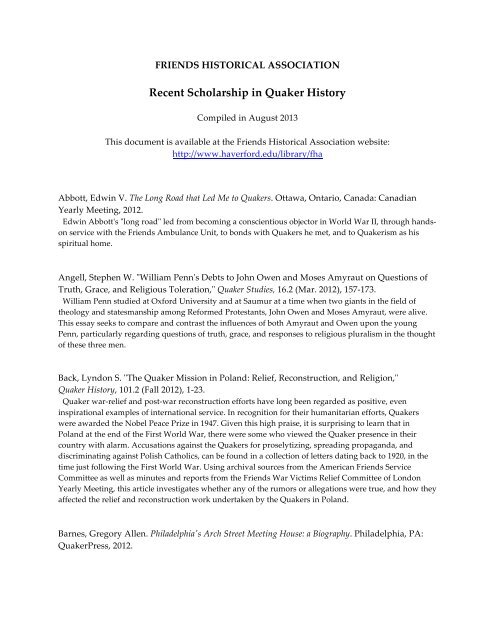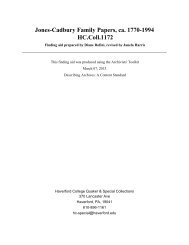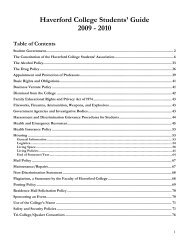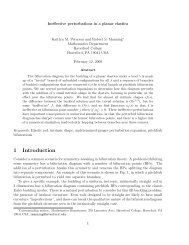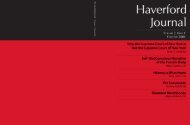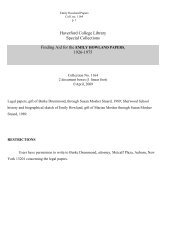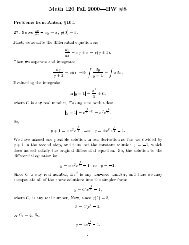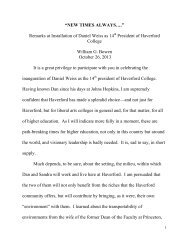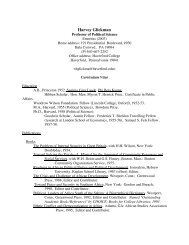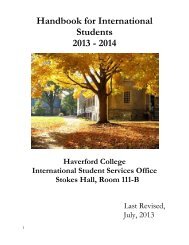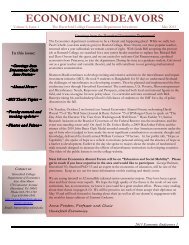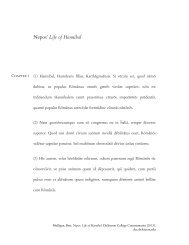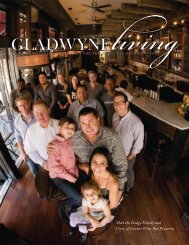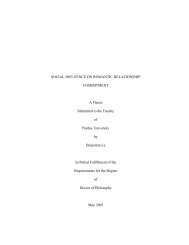Recent Scholarship in Quaker History - Haverford College
Recent Scholarship in Quaker History - Haverford College
Recent Scholarship in Quaker History - Haverford College
Create successful ePaper yourself
Turn your PDF publications into a flip-book with our unique Google optimized e-Paper software.
FRIENDS HISTORICAL ASSOCIATION<br />
<strong>Recent</strong> <strong>Scholarship</strong> <strong>in</strong> <strong>Quaker</strong> <strong>History</strong><br />
Compiled <strong>in</strong> August 2013<br />
This document is available at the Friends Historical Association website:<br />
http://www.haverford.edu/library/fha<br />
Abbott, Edw<strong>in</strong> V. The Long Road that Led Me to <strong>Quaker</strong>s. Ottawa, Ontario, Canada: Canadian<br />
Yearly Meet<strong>in</strong>g, 2012.<br />
Edw<strong>in</strong> Abbott'ʹs "ʺlong road"ʺ led from becom<strong>in</strong>g a conscientious objector <strong>in</strong> World War II, through hands-‐on<br />
service with the Friends Ambulance Unit, to bonds with <strong>Quaker</strong>s he met, and to <strong>Quaker</strong>ism as his<br />
spiritual home.<br />
Angell, Stephen W. "ʺWilliam Penn'ʹs Debts to John Owen and Moses Amyraut on Questions of<br />
Truth, Grace, and Religious Toleration,"ʺ <strong>Quaker</strong> Studies, 16.2 (Mar. 2012), 157-‐‐173.<br />
William Penn studied at Oxford University and at Saumur at a time when two giants <strong>in</strong> the field of<br />
theology and statesmanship among Reformed Protestants, John Owen and Moses Amyraut, were alive.<br />
This essay seeks to compare and contrast the <strong>in</strong>fluences of both Amyraut and Owen upon the young<br />
Penn, particularly regard<strong>in</strong>g questions of truth, grace, and responses to religious pluralism <strong>in</strong> the thought<br />
of these three men.<br />
Back, Lyndon S. "ʺThe <strong>Quaker</strong> Mission <strong>in</strong> Poland: Relief, Reconstruction, and Religion,"ʺ<br />
<strong>Quaker</strong> <strong>History</strong>, 101.2 (Fall 2012), 1-‐‐23.<br />
<strong>Quaker</strong> war-‐‐relief and post-‐‐war reconstruction efforts have long been regarded as positive, even<br />
<strong>in</strong>spirational examples of <strong>in</strong>ternational service. In recognition for their humanitarian efforts, <strong>Quaker</strong>s<br />
were awarded the Nobel Peace Prize <strong>in</strong> 1947. Given this high praise, it is surpris<strong>in</strong>g to learn that <strong>in</strong><br />
Poland at the end of the First World War, there were some who viewed the <strong>Quaker</strong> presence <strong>in</strong> their<br />
country with alarm. Accusations aga<strong>in</strong>st the <strong>Quaker</strong>s for proselytiz<strong>in</strong>g, spread<strong>in</strong>g propaganda, and<br />
discrim<strong>in</strong>at<strong>in</strong>g aga<strong>in</strong>st Polish Catholics, can be found <strong>in</strong> a collection of letters dat<strong>in</strong>g back to 1920, <strong>in</strong> the<br />
time just follow<strong>in</strong>g the First World War. Us<strong>in</strong>g archival sources from the American Friends Service<br />
Committee as well as m<strong>in</strong>utes and reports from the Friends War Victims Relief Committee of London<br />
Yearly Meet<strong>in</strong>g, this article <strong>in</strong>vestigates whether any of the rumors or allegations were true, and how they<br />
affected the relief and reconstruction work undertaken by the <strong>Quaker</strong>s <strong>in</strong> Poland.<br />
Barnes, Gregory Allen. Philadelphia'ʹs Arch Street Meet<strong>in</strong>g House: a Biography. Philadelphia, PA:<br />
<strong>Quaker</strong>Press, 2012.
2<br />
Braithwaite, Geoffrey. Rachel Wilson and Her <strong>Quaker</strong> Mission <strong>in</strong> 18th Century America. York,<br />
England: Sessions Books, 2012.<br />
This book tells the story of Rachel Wilson (1720-‐‐1775) and her religious visit to America, 1768-‐‐1769,<br />
draw<strong>in</strong>g extensively on her journal and a wide range of other sources. Includes <strong>in</strong>dex to Wilson'ʹs journal.<br />
Brown, Francis G. <strong>Quaker</strong> Legacy: a Family Homestead. Down<strong>in</strong>gtown, PA: John Bryer<br />
Publications, 2012.<br />
Memoirs of Francis G. Brown (1917-‐‐2012), a graduate of <strong>Haverford</strong> <strong>College</strong>, who served as General<br />
Secretary of Philadelphia Yearly Meet<strong>in</strong>g and is the author of several books on local <strong>Quaker</strong> history.<br />
Brekus, Cather<strong>in</strong>e A. "ʺWrit<strong>in</strong>g Religious Experience: Women’s Authorship <strong>in</strong> Early America,"ʺ<br />
The Journal of Religion, 92.4 (October 2012), 482-‐‐497.<br />
Many women <strong>in</strong> early America wrote letters, poems, and diaries, but only a few ever saw their work <strong>in</strong><br />
pr<strong>in</strong>t. Publish<strong>in</strong>g was almost entirely a mascul<strong>in</strong>e enterprise. Congregationalist and <strong>Quaker</strong> women<br />
dom<strong>in</strong>ated the list of female authors <strong>in</strong> America before the Revolution. Despite their theological<br />
differences, both <strong>Quaker</strong>s and Congregationalists preached a heart-‐‐centered religion that emphasized the<br />
importance of personal experience. Although they never encouraged women to publish theological<br />
treatises or grand narratives of providential history, they believed that women’s personal stories of s<strong>in</strong><br />
and salvation could serve as valuable models of piety for other Christians, especially women.<br />
Brown, Patricia. Susanna'ʹs Sisters: Early <strong>Quaker</strong> Women and the Sects of Seventeenth-‐‐Century<br />
England / by Patricia Brown and Simon Webb. [England?]: Langley Press, 2012.<br />
The <strong>Quaker</strong>s were just one of the new religious groups that emerged dur<strong>in</strong>g the turbulent seventeenth<br />
century <strong>in</strong> England. This book looks at these groups from the female po<strong>in</strong>t of view, and compares the<br />
lives of early <strong>Quaker</strong> women with those of women from other sects.<br />
Calvert, Jane E. "ʺLetter to Farmers <strong>in</strong> Pennsylvania: John Dick<strong>in</strong>son Writes to the Paxton Boys,"ʺ<br />
Pennsylvania Magaz<strong>in</strong>e of <strong>History</strong> &Biography, 136.4 (2012), 475-‐‐477.<br />
Discusses a letter written by Pennsylvania Assemblyman John Dick<strong>in</strong>son caution<strong>in</strong>g the Paxton Boys, a<br />
group of Scots-‐‐Irish frontiersman, of ways <strong>in</strong> which their conflicts with Native Americans could lead to<br />
British military presence <strong>in</strong> the colony and violence aga<strong>in</strong>st fellow white colonists. The article explores<br />
how Dick<strong>in</strong>son used religious and Biblical references <strong>in</strong> the letter to appeal to the Paxton Boys'ʹ<br />
sensibilities, comments on the <strong>in</strong>fluence of <strong>Quaker</strong> political power on Dick<strong>in</strong>son'ʹs writ<strong>in</strong>gs, and discusses<br />
Dick<strong>in</strong>son'ʹs <strong>in</strong>teractions with Governor John Penn
3<br />
Carroll, Stuart. "ʺA Yorkshireman <strong>in</strong> the Bastille: John Harwood and the <strong>Quaker</strong> Mission to<br />
Paris"ʺ by Stuart Carroll and Andrew Hopper <strong>in</strong> Gett<strong>in</strong>g Along? Religious Identities and<br />
Confessional Relations <strong>in</strong> Early Modern England: Essays <strong>in</strong> Honour of Professor W.J. Sheils edited by<br />
Nad<strong>in</strong>e Lewycky. Farmham [Great Brita<strong>in</strong>]: Ashgate Publish<strong>in</strong>g Ltd., 2012, 185-‐‐212.<br />
The discovery of the <strong>in</strong>terrogations of John Harwood on 6 and 9 July 1657 throws fresh light on this<br />
obscure but potentially significant episode of Anglo-‐‐French relations.<br />
Carter, L<strong>in</strong>da F. From <strong>Quaker</strong>s to Cowboys: the Journey: Tales of an Adventurous Family'ʹs Journey<br />
Through Four Centuries of <strong>History</strong>. North Charleston, South Carol<strong>in</strong>a: CreateSpace, 2012.<br />
The author set out to solve a mystery -‐‐-‐‐ why did the <strong>Quaker</strong> Evans family leave Wales <strong>in</strong> the 17th<br />
century to come to the American colonies and how did they end up be<strong>in</strong>g Baptist cowboys <strong>in</strong> Texas by<br />
the 19th century?<br />
Chrystal, Paul. The Rowntree Family of York: a Social <strong>History</strong>. Picker<strong>in</strong>g, United K<strong>in</strong>gdom:<br />
Blackthorn Press, 2013.<br />
Driven by their <strong>Quaker</strong> faith, generations of the Rowntree family engaged with the welfare of their<br />
workers, improv<strong>in</strong>g not only the conditions they worked under but provid<strong>in</strong>g a range of benefits from<br />
hous<strong>in</strong>g to education. Their concerns ranged from the identification of the causes of poverty and work on<br />
its eradication, which has been seen as one of the beg<strong>in</strong>n<strong>in</strong>gs of the welfare state, to support<strong>in</strong>g <strong>Quaker</strong><br />
concerns with the treatment of the mentally ill, the causes and prevention of war and the education of the<br />
work<strong>in</strong>g classes. The book looks at the tensions that exist between bus<strong>in</strong>ess practice and a faith which<br />
demands absolute honesty from its adherents.<br />
Marsh, Dawn. "ʺOld Friends <strong>in</strong> New Territories: Delawares and <strong>Quaker</strong>s <strong>in</strong> the Old Northwest<br />
Territory,"ʺ <strong>in</strong> Contested Territories: Native Americans and Non-‐‐Natives <strong>in</strong> the Lower Great Lakes,<br />
1700-‐‐1850 / edited by Charles Beatty-‐‐Med<strong>in</strong>a and Melissa R<strong>in</strong>ehart. East Lans<strong>in</strong>g : Michigan<br />
State University Press, 2012, 81-‐‐110.<br />
The Delaware Indians and <strong>Quaker</strong>s shared a unique history of alliance and mutual acceptance that<br />
began from their earliest diplomatic exchange <strong>in</strong> the Delaware River Valley at the end of the 17th century<br />
and rema<strong>in</strong>ed <strong>in</strong>tertw<strong>in</strong>ed throughout the 18th century <strong>in</strong> the Lower Great Lake region.<br />
Cooper, Jane. Embroider<strong>in</strong>g <strong>History</strong>: an Englishwoman'ʹs Experience as a Humanitarian Aid Volunteer<br />
<strong>in</strong> Post-‐‐War Poland, 1924-‐‐1925. Derby [Great Brita<strong>in</strong>]: DB Publish<strong>in</strong>g, 2012.<br />
Provides a glimpse <strong>in</strong>side the <strong>in</strong>ner work<strong>in</strong>gs of an early humanitarian aid project through the letters of<br />
a middle class English woman, Margaret Tregear (1897-‐‐1984), who left teach<strong>in</strong>g to volunteer with a<br />
<strong>Quaker</strong> project to provide <strong>in</strong>come-‐‐generat<strong>in</strong>g work for refugee peasant women. The <strong>in</strong>troduction places<br />
the project <strong>in</strong> the wider context of humanitarian aid provision <strong>in</strong> the aftermath of World War I, and<br />
explores how the different motives and expectations of the people <strong>in</strong>volved -‐‐-‐‐ <strong>in</strong>ternational staff, local<br />
staff, project beneficiaries, and local power brokers -‐‐-‐‐ shaped the project'ʹs outcomes, and revealed<br />
conflicts rooted <strong>in</strong> culture and power.
4<br />
Coutts, Peter J. F. "ʺMembers and Descendants of the Newgarden Meet<strong>in</strong>g, County Carlow-‐‐<br />
Demographic Profiles 1600-‐‐1899: Part 1,"ʺ <strong>Quaker</strong> Studies, 17.1 (Sept. 2012), 48-‐‐109.<br />
This paper, presented <strong>in</strong> two parts, def<strong>in</strong>es a select number of demographic markers for the population<br />
that comprised members of the Newgarden Meet<strong>in</strong>g, County Carlow, Ireland and their descendants,<br />
1600-‐‐1900.<br />
Crawford, Michael J. "ʺThe Pace of Manumission among <strong>Quaker</strong>s <strong>in</strong> Revolutionary-‐‐Era<br />
North Carol<strong>in</strong>a,"ʺ <strong>Quaker</strong> <strong>History</strong>, 102.1 (Spr<strong>in</strong>g 2013), 1-‐‐16.<br />
The standard narrative of the <strong>Quaker</strong> manumission movement traces the growth of antislavery<br />
sentiment among Friends until it became the consensus of the yearly meet<strong>in</strong>g. Historians’ emphasis has<br />
been on expla<strong>in</strong><strong>in</strong>g the growth of antislavery sentiment and not on expla<strong>in</strong><strong>in</strong>g the persistence of the<br />
oppos<strong>in</strong>g m<strong>in</strong>d-‐‐set. Eastern North Carol<strong>in</strong>a offers an opportunity for a case study <strong>in</strong> the unevenness of<br />
the process of manumission among <strong>Quaker</strong>s. The experience of eastern North Carol<strong>in</strong>a demonstrates that<br />
the Yearly Meet<strong>in</strong>g’s establish<strong>in</strong>g a requirement that members free their slaves did not represent the end<br />
of the struggle to abolish slavehold<strong>in</strong>g among Friends, for much work rema<strong>in</strong>ed before the entire<br />
membership would be persuaded to free their slaves. The statement that North Carol<strong>in</strong>a Friends<br />
renounced slavehold<strong>in</strong>g <strong>in</strong> 1775 should come near the beg<strong>in</strong>n<strong>in</strong>g, not the end, of the story.<br />
Deutsche Quäkerschriften des 17. Jahrhunderts / [edited and <strong>in</strong>troduced by] Claus Bernet.<br />
Hildesheim; Zürich; New York: Olms, 2012.<br />
Includes facsimiles of German-‐‐language editions of early <strong>Quaker</strong> writ<strong>in</strong>gs by William Ames, Robert<br />
Barclay, William Caton, George Fox, Francis Howgill, James Parnel, and William Penn.<br />
Drescher, Seymour. "ʺThe Shock<strong>in</strong>g Birth of British Abolitionism,"ʺ Slavery & Abolition, 33.4<br />
(2012), 571-‐‐593.<br />
The emergence of the British abolitionist movement has often been conceived as a direct response to the<br />
trauma of the American Revolutionary War. There is little evidence that the British public embraced<br />
abolitionism as a response to such a loss, either politically, culturally or psychologically. On the contrary,<br />
British anti-‐‐slavery mobilization aga<strong>in</strong>st the slave trade emerged and flourished <strong>in</strong> moments of national<br />
optimism and confidence. It is therefore as important to understand the contextual pressures that<br />
operated <strong>in</strong> account<strong>in</strong>g for the emergence of this powerful political movement as it is to understand the<br />
motives and methods of its entrepreneurs.<br />
Drury, George. <strong>Quaker</strong> Pegg. [Great Brita<strong>in</strong>]: George Drury, 2011.<br />
William Pegg (1775-‐‐1851) was a young ceramic artist specializ<strong>in</strong>g <strong>in</strong> flower pa<strong>in</strong>t<strong>in</strong>g. When he became a<br />
<strong>Quaker</strong> <strong>in</strong> 1800 he attempted to give up his livelihood due to the <strong>Quaker</strong> stricture aga<strong>in</strong>st images,<br />
likenesses and figures. Pegg returned to his artistry for a time (1813-‐‐1820) then gave it up entirely aga<strong>in</strong>.
5<br />
Edd<strong>in</strong>gton, A. S. A.S. Edd<strong>in</strong>gton and the Unity of Knowledge: Scientist, <strong>Quaker</strong> & Philosopher: a<br />
Selection of the Edd<strong>in</strong>gton Memorial Lectures / edited by Volker He<strong>in</strong>e; preface by Mart<strong>in</strong> Rees.<br />
Cambridge; New York: Cambridge University Press, 2013.<br />
Sir Arthur Stanley Edd<strong>in</strong>gton (1882-‐‐1944), a key figure <strong>in</strong> the development of modern astrophysics, also<br />
made important contributions to the philosophy of science and popular science writ<strong>in</strong>g. The Arthur<br />
Edd<strong>in</strong>gton Memorial Trust was set up after his death <strong>in</strong> order to hold annual lectures on the relationship<br />
between scientific thought and aspects of philosophy, religion or ethics. This 2012 collection gathers<br />
together six of these lectures, <strong>in</strong>clud<strong>in</strong>g contributions by Sir Edmund Whittaker, Herbert D<strong>in</strong>gle, Richard<br />
B. Braithwaite, John C. Eccles, Dame Kathleen Lonsdale, and Baroness Mary Warnock, together with<br />
Edd<strong>in</strong>gton'ʹs 1929 Swarthmore Lecture, Science and the Unseen World.<br />
Edmonds, Penelope. "ʺTravell<strong>in</strong>g 'ʹUnder Concern'ʹ: <strong>Quaker</strong>s James Backhouse and George<br />
Wash<strong>in</strong>gton Walker Tour the Antipodean Colonies, 1832-‐‐41,"ʺ Journal of Imperial and<br />
Commonwealth <strong>History</strong>, 40.5 (2012), 769-‐‐88.<br />
In 1832, British <strong>Quaker</strong>s James Backhouse and George Wash<strong>in</strong>gton Walker travelled 'ʹunder concern'ʹ on<br />
a trans-‐‐imperial journey that took n<strong>in</strong>e years and spanned the Australian colonies of Van Diemen'ʹs Land,<br />
New South Wales and Swan River <strong>in</strong> Western Australia, Mauritius and South Africa'ʹs Cape Colony.<br />
Backhouse and Walker were fundamental to the creation and expansion of humanitarian networks <strong>in</strong> the<br />
antipodes, where they made major humanitarian <strong>in</strong>terventions <strong>in</strong> matters concern<strong>in</strong>g Aborig<strong>in</strong>al peoples,<br />
penal reform, slavery and education.<br />
Emil Fuchs: Das Evangelium nach Matthäus: e<strong>in</strong>e Auslegung des Evangeliums im<br />
Kontext von Verfolgung und Widerstand (1933-‐‐35) / [edited by] Claus Bernet und Klaus Fuchs-‐‐<br />
Kittowski. Hamburg [Germany]: Kovač, 2012.<br />
An <strong>in</strong>terpretation of the Gospel of Matthew <strong>in</strong> the context of Nazi persecution and anti-‐‐Nazi resistance,<br />
1933-‐‐1935. Includes biographical <strong>in</strong>formation about Emil Fuchs, who was a German <strong>Quaker</strong>.<br />
Erben, Patrick M. A Harmony of the Spirits: Translation and the Language of Community <strong>in</strong> Early<br />
Pennsylvania. Chapel Hill: Published for the Omohundro Institute of Early American <strong>History</strong><br />
and Culture, Williamsburg, Virg<strong>in</strong>ia, by the University of North Carol<strong>in</strong>a Press, 2012.<br />
Draw<strong>in</strong>g on German and English archival sources, Erben exam<strong>in</strong>es iconic translations that engendered<br />
community <strong>in</strong> colonial Pennsylvania, <strong>in</strong>clud<strong>in</strong>g William Penn'ʹs transl<strong>in</strong>gual promotional literature,<br />
Francis Daniel Pastorius'ʹs multil<strong>in</strong>gual poetics, Ephrata'ʹs "ʺangelic"ʺ s<strong>in</strong>g<strong>in</strong>g and transcendent calligraphy,<br />
the Moravians'ʹ polyglot missions, and the common language of suffer<strong>in</strong>g for peace among <strong>Quaker</strong>s,<br />
Pietists, and Mennonites.<br />
Flack, John S., Jr. Evesham Township. Charleston, S.C.: Arcadia Pub., 2012.<br />
Established <strong>in</strong> 1688, Evesham Township <strong>in</strong> New Jersey was settled by members of the Society of Friends<br />
who found it to be a place where they could worship freely. Many homes of the orig<strong>in</strong>al settlers as well as<br />
<strong>Quaker</strong> meet<strong>in</strong>ghouses still stand today.
6<br />
Forbes, Cathar<strong>in</strong>e. A <strong>Quaker</strong> Marriage of Philosophy and Art: Words and Pictures of Howard and<br />
Anna Br<strong>in</strong>ton / compiled by Cathar<strong>in</strong>e Forbes with Cathar<strong>in</strong>e Br<strong>in</strong>ton Cary and Joan Br<strong>in</strong>ton<br />
Erickson. Philadelphia: <strong>Quaker</strong>Press of FGC; [Wall<strong>in</strong>gford, Pa.]: Pendle Hill Publications, 2012.<br />
A <strong>Quaker</strong> Marriage captures the character and wisdom of Howard Br<strong>in</strong>ton and Anna Cox Br<strong>in</strong>ton, who<br />
<strong>in</strong>fluenced a generation of Friends through their leadership as co-‐‐directors of Pendle Hill and through<br />
many publications. Anna Br<strong>in</strong>ton'ʹs <strong>in</strong>tricately drawn Christmas cards illustrate the story of their journey,<br />
<strong>in</strong>terspersed with many quotations.<br />
Frost, J. William. "ʺWilliam Penn: <strong>Quaker</strong>,"ʺ <strong>Quaker</strong> Studies, 16.2 (Mar. 2012), 174-‐‐189.<br />
There is a tradition of Christian humanism from Erasmus, Grotius, Momay, and Amyraut that Penn<br />
probably learned at Saumur and that served as an undercurrent to the rest of his life. While it is<br />
impossible def<strong>in</strong>itively to prove direct <strong>in</strong>fluence, the similarities between Amyraut'ʹs ideas and Penn'ʹs<br />
later perspectives make the possibility of <strong>in</strong>fluence likely.<br />
Gertz, Genelle. Heresy Trials and English Women Writers, 1400–1670. Cambridge : Cambridge<br />
University Press, 2012.<br />
Includes extensive reference to <strong>Quaker</strong> women, <strong>in</strong>clud<strong>in</strong>g Kather<strong>in</strong>e Evans and Sarah Cheevers.<br />
Goodbody, Michael I. A. The Goodbodys: Millers, Merchants and Manufacturers: the Story of an Irish<br />
<strong>Quaker</strong> Family 1630-‐‐1950. Dubl<strong>in</strong>: Ashfield, 2011.<br />
The <strong>Quaker</strong> Goodbody family members came to prom<strong>in</strong>ence <strong>in</strong> the 19th century when they started<br />
flour-‐‐mill<strong>in</strong>g, later branch<strong>in</strong>g out <strong>in</strong>to jute, tobacco and the tea trade, as well as stockbrok<strong>in</strong>g and the law.<br />
This book follows their fortunes from the time of their arrival <strong>in</strong> Ireland and conversion to <strong>Quaker</strong>ism,<br />
through 1826, when Robert Goodbody (1781-‐‐1860) started mill<strong>in</strong>g <strong>in</strong> the town of Clara. The family used<br />
its wealth to alleviate distress dur<strong>in</strong>g the Fam<strong>in</strong>e years and <strong>in</strong> develop<strong>in</strong>g the town of Clara. The book<br />
also looks at the impact of <strong>Quaker</strong>s on the Irish economy.<br />
Goode, Michael. "ʺA Failed Peace: The Friendly Association and the Pennsylvania Backcountry<br />
Dur<strong>in</strong>g the Seven Years'ʹ War,"ʺ Pennsylvania Magaz<strong>in</strong>e of <strong>History</strong> & Biography, 136.4 (Oct. 2012),<br />
472-‐‐474.<br />
Presents a brief history of the Friendly Association, an organization of <strong>Quaker</strong>s aimed at establish<strong>in</strong>g<br />
peace between Native American groups and Pennsylvanians dur<strong>in</strong>g the 18th century, focus<strong>in</strong>g on its role<br />
dur<strong>in</strong>g the French and Indian War. The article details several historically significant documents that can<br />
be found <strong>in</strong> the papers of the Friendly Association at the Historical Society of Pennsylvania related to<br />
topics <strong>in</strong>clud<strong>in</strong>g <strong>Quaker</strong> philanthropist Israel Pemberton, government treaties with Ohio Valley and<br />
Lenape Indian groups, and m<strong>in</strong>utes from the Association'ʹs meet<strong>in</strong>gs.
7<br />
Graham, Daniel A. Thomas Mayburry III of Green Lane Forge, Hereford Furnace and Pottstown,<br />
Pennsylvania: Merchant, Ironmaster, Miller. Pennsburg, PA: Schwenkfelder Library & Heritage<br />
Center, 2012.<br />
Thomas Mayburry, <strong>Quaker</strong>, born ca. 1740, died 1797.<br />
Ha<strong>in</strong>es, Deborah L. "ʺWilliam Penn’s Townships, the 'ʹCheshire Friends'ʹ and the Shape of<br />
Community <strong>in</strong> America,"ʺ <strong>Quaker</strong> <strong>History</strong>, 101.2 (Fall 2012), 24-‐‐56.<br />
The farm country of colonial Pennsylvania seems to have been unusually well suited to the nurtur<strong>in</strong>g of<br />
a pluralistic, democratic society. As James Lemon observed <strong>in</strong> his classic study of social geography,<br />
Penn’s young colony rapidly emerged as “the best poor man’s country.”<br />
Hampton, Bryan Adams. "ʺPageant and Anti-‐‐Pageant: James Nayler and the Div<strong>in</strong>e Economy of<br />
Incarnation <strong>in</strong> the <strong>Quaker</strong> Theodrama"ʺ <strong>in</strong> Fleshly Tabernacles: Milton and the Incarnational Poetics<br />
of Revolutionary England. Notre Dame, Ind.: University of Notre Dame Press, 2012, 265-‐‐292.<br />
Hampton discusses James Nayler'ʹs imitation of Christ'ʹs entry <strong>in</strong>to Jerusalem with<strong>in</strong> the context of<br />
<strong>Quaker</strong>s'ʹ discourse of the Inner Light and its radical adoptionist theology.<br />
Hard<strong>in</strong>, William Fernandez. Litigat<strong>in</strong>g the Lash: <strong>Quaker</strong> Emancipator Robert Pleasants, the Law of<br />
Slavery, and the Mean<strong>in</strong>g of Manumission <strong>in</strong> Revolutionary and Early National Virg<strong>in</strong>ia.<br />
Thesis (Ph. D.)-‐‐-‐‐Vanderbilt University, 2013.<br />
Seeks to show how ord<strong>in</strong>ary people -‐‐-‐‐ black and white, free and enslaved -‐‐-‐‐ shaped the law of<br />
manumission at a critical moment <strong>in</strong> American history. It is a detailed legal, cultural and family history of<br />
the Virg<strong>in</strong>ia case of Pleasants v. Pleasants (1799), <strong>in</strong> which Robert Pleasants sued his nieces, nephews,<br />
sibl<strong>in</strong>gs and cous<strong>in</strong>s for the freedom of over four hundred slaves <strong>in</strong> the Virg<strong>in</strong>ia Court of Appeals, the<br />
state'ʹs highest tribunal <strong>in</strong> the largest manumission case <strong>in</strong> American history.<br />
Harwell, Jonathan H. Settl<strong>in</strong>g and Lay<strong>in</strong>g Down: a Cultural <strong>History</strong> of <strong>Quaker</strong>s <strong>in</strong> Savannah and<br />
Statesboro, Georgia. Thesis (M.F.A.) Georgia Southern University, 2012.<br />
Explores some similarities and differences between two <strong>Quaker</strong> meet<strong>in</strong>gs <strong>in</strong> Southeast Georgia, the<br />
small but grow<strong>in</strong>g urban meet<strong>in</strong>g <strong>in</strong> Savannah and a discont<strong>in</strong>ued rural one <strong>in</strong> the small college town of<br />
Statesboro (that sometimes met <strong>in</strong> the village of Guyton). These case studies of local and personal<br />
histories, comb<strong>in</strong>ed with observations as a participant <strong>in</strong> the life of the community, are designed to<br />
illum<strong>in</strong>ate f<strong>in</strong>e details of <strong>Quaker</strong> culture <strong>in</strong> the recent Deep South.<br />
Harvey, Sean P. "ʺAn Eighteenth-‐‐Century L<strong>in</strong>guistic Borderland,"ʺ Pennsylvania Magaz<strong>in</strong>e of<br />
<strong>History</strong> & Biography, 136.4 (2012), 495-‐‐498.<br />
Discusses the journals of James Kenny, a Pennsylvanian colonist and <strong>Quaker</strong> trader, focus<strong>in</strong>g on<br />
Kenny'ʹs depiction of the l<strong>in</strong>guistic differences of English, German, and Scots-‐‐Irish immigrants and their<br />
relations with Algonqu<strong>in</strong>, Sioux, and Iroquois Indian tribes.
8<br />
Hedstrom, Matthew S. The Rise of Liberal Religion: Book Culture and American Spirituality <strong>in</strong> the<br />
Twentieth Century. New York: Oxford University Press, 2013.<br />
Rufus M. Jones is a central figure <strong>in</strong> this discussion.<br />
Higgs, Cather<strong>in</strong>e. Chocolate Islands: Cocoa, Slavery, and Colonial Africa. Athens : Ohio University<br />
Press, 2012.<br />
Traces the early-‐‐twentieth-‐‐century journey of the Englishman Joseph Burtt to the Portuguese colony of<br />
São Tomé and Príncipe—the chocolate islands—through Angola and Mozambique, and f<strong>in</strong>ally to British<br />
Southern Africa. Burtt had been hired by the chocolate firm Cadbury Brothers Limited to determ<strong>in</strong>e if the<br />
cocoa it was buy<strong>in</strong>g from the islands had been harvested by slave laborers forcibly recruited from<br />
Angola, an allegation that became one of the grand scandals of the early colonial era.<br />
Howard, Joy A. "ʺAnti-‐‐<strong>Quaker</strong> Tropes of New World Possession, 1656-‐‐1675"ʺ <strong>in</strong> Spirited <strong>in</strong>to<br />
America: Narratives of Possession, 1650-‐‐1850. Thesis (Ph.D.) Purdue University, 2011.<br />
The first two chapters, which take up the <strong>Quaker</strong> "ʺ<strong>in</strong>vasion"ʺ of the 1650s and the aftermath of the Salem<br />
witchcraft trials <strong>in</strong> 1692, illustrate that while colonial authors recapitulated many of the Old World bodily<br />
tropes, they also started to draw upon the stereotypes of a wild New World besieged with devils, devil-‐possessed<br />
Indians, and demonic slavery.<br />
Jones, Esther Balderston. Much Love To All : The Letters and Diary of Esther Alsop Balderston /<br />
edited by Cathy Gaskill. [Los Gatos, Calif.] : Smashwords, Inc., 2011.<br />
Esther Alsop Balderston (ca. 1890-‐‐1967), a graduate of Wellesley, became a <strong>Quaker</strong> missionary teach<strong>in</strong>g<br />
Bible, English and sew<strong>in</strong>g at Friends Girls School, Tokyo, and was Press Super<strong>in</strong>tendent of the Japan<br />
Women'ʹs Christian Temperance Union. She married Thomas Elsa Jones <strong>in</strong> 1917.<br />
Lampen, Diana. A Small Share <strong>in</strong> <strong>History</strong>: a <strong>Quaker</strong> Initiative <strong>in</strong> Eastern Europe / Diana & John<br />
Lampen. Stourbridge, U.K.: The Hope Project; Edgbaston: West Midlands <strong>Quaker</strong> Peace<br />
Education Project, 2013.<br />
Describes a <strong>Quaker</strong> <strong>in</strong>itiative visit<strong>in</strong>g Belarus and Ukra<strong>in</strong>e between 1991 and 2004, as they emerged<br />
from the Soviet Union, shar<strong>in</strong>g methods of creative conflict handl<strong>in</strong>g <strong>in</strong> schools and <strong>in</strong>ter-‐‐active<br />
classroom approaches; and work<strong>in</strong>g <strong>in</strong> Croatia, Macedonia and Bosnia and Herzegov<strong>in</strong>a from 1996 to<br />
2012 with civil society groups which were try<strong>in</strong>g to forge a positive way forward after the civil wars.<br />
Lyon, Cherst<strong>in</strong> M. Prisons and Patriots: Japanese American Wartime Citizenship, Civil Disobedience,<br />
and Historical Memory. Philadelphia: Temple University Press, 2012.<br />
Provides a detailed account of forty-‐‐one Nisei (second-‐‐generation Japanese Americans), known as the<br />
Tucsonians, who were imprisoned for resist<strong>in</strong>g the draft dur<strong>in</strong>g World War II. Cherst<strong>in</strong> Lyon parallels<br />
their courage as resisters with that of civil rights hero Gordon Hirabayashi, a <strong>Quaker</strong>, well known for his<br />
legal battle aga<strong>in</strong>st curfew and <strong>in</strong>ternment, who also resisted the draft.
9<br />
May, Isaac. "ʺThe President'ʹs Friends and Foes: The Effect of the Nixon Presidency on the<br />
Divisions of American <strong>Quaker</strong>ism,"ʺ <strong>Quaker</strong> <strong>History</strong>, 102.1 (Spr<strong>in</strong>g 2013), 17-‐‐38.<br />
A key element <strong>in</strong> the fracture among Friends would be the question of Richard Nixon’s place with<strong>in</strong> the<br />
<strong>Quaker</strong> faith. For many Friends, Nixon was not just any President; defense or criticism of his policies<br />
began to serve as a focus for the arguments about divisions between <strong>Quaker</strong> factions.<br />
McKanan, Dan. Prophetic Encounters: Religion and the American Radical Tradition. Boston, Mass.:<br />
Beacon Press, 2011.<br />
Includes references to <strong>Quaker</strong>s.<br />
Miller, Susan Anderson. "ʺThe Light With<strong>in</strong>: Glimpses <strong>in</strong>to the Lives and Education of Young<br />
<strong>Quaker</strong> Children (1820-‐‐1860)"ʺ <strong>in</strong> The Hidden <strong>History</strong> of Early Childhood Education, edited by<br />
Blythe Farb H<strong>in</strong>itz. New York: Routledge, 2013, 7-‐‐32.<br />
Expla<strong>in</strong>s how various beliefs emphasized by <strong>Quaker</strong>s, such a helpfulness, honesty, equality, simplicity<br />
and resourcefulness, <strong>in</strong>fluenced the daily life of <strong>Quaker</strong> children. Includes references to <strong>Quaker</strong>s<br />
Rowland T. Rob<strong>in</strong>son and Rachel Gilp<strong>in</strong> Rob<strong>in</strong>son of Rokeby <strong>in</strong> Ferrisburgh, Vermont.<br />
Moore, Rosemary. "ʺTowards a Revision of The Second Period of <strong>Quaker</strong>ism,"ʺ <strong>Quaker</strong> Studies, 17.1<br />
(Sept. 2012), 7-‐‐26.<br />
W.C. Braithwaite'ʹs The Second Period of <strong>Quaker</strong>ism is over n<strong>in</strong>ety years old, and rema<strong>in</strong>s the standard<br />
work on <strong>Quaker</strong>ism <strong>in</strong> the later seventeenth century and the beg<strong>in</strong>n<strong>in</strong>g of the eighteenth. This paper<br />
suggests possible contents for a new book on the <strong>Quaker</strong> history of that period.<br />
Moran, Gerard. "ʺJames Hack Tuke and His Schemes for Assisted Emigration from the West of<br />
Ireland"ʺ <strong>History</strong> Ireland, 23.3 (2013), 30-‐‐34.<br />
Outl<strong>in</strong>es the efforts of a <strong>Quaker</strong> who advocated a fresh approach to the Irish west’s perennial problems<br />
of destitution and poverty <strong>in</strong> the second half of the n<strong>in</strong>eteenth century.<br />
Morgan, John H. "ʺThe Free <strong>Quaker</strong>s Reaffirm<strong>in</strong>g the Legacy of Conscience and Liberty (the<br />
Spiritual Journey of a Solitary People),"ʺ Journal for the Study of Religions and Ideologies, 11.32<br />
(Summer 2012), 288-‐‐305.<br />
An exploration of the "ʺFree Friends of Philadelphia"ʺ and their modern progeny, the Free <strong>Quaker</strong>s of<br />
Indiana.<br />
Morris, Kenneth R. "ʺTheological Sources of William Penn'ʹs Concept of Religious Toleration,"ʺ<br />
<strong>Quaker</strong> Studies, 16.2 (Mar. 2012), 190-‐‐212.<br />
William Penn left no direct testimony as to the sources of his <strong>in</strong>tellectual and theological development.<br />
Through an <strong>in</strong>vestigation of the possible <strong>in</strong>fluences on Penn up to when he wrote the majority of his
10<br />
works on religious toleration, however, it is possible to argue that the major <strong>in</strong>fluences often credited <strong>in</strong><br />
Penn'ʹs development -‐‐-‐‐ contemporary European philosophy and two years of study at Oxford -‐‐-‐‐ are much<br />
less plausible than his two years at the Saumur Academy <strong>in</strong> France under the <strong>in</strong>struction of Moses<br />
Amyraut.<br />
Noyalas, Jonathan A. "ʺThat Woman Was Worth A Whole Brigade."ʺ Civil War Times, 51.3 (June<br />
2012), 42-‐‐47.<br />
Discusses the significance of the assistance provided by the Virg<strong>in</strong>ian <strong>Quaker</strong> schoolteacher Rebecca<br />
Wright to U.S. Army major Philip Sheridan <strong>in</strong> the Third Battle of W<strong>in</strong>chester <strong>in</strong> 1864 dur<strong>in</strong>g the U.S. Civil<br />
War. Accord<strong>in</strong>g to the article, Wright'ʹs loyalties were <strong>in</strong>itially questioned by Sheridan as she was a<br />
resident of pro-‐‐Southern W<strong>in</strong>chester, Virg<strong>in</strong>ia. The article also discusses the possibility of violence aga<strong>in</strong>st<br />
Wright'ʹs family for cooperat<strong>in</strong>g with the Union army.<br />
Ohio Yearly Meet<strong>in</strong>g of Friends (Conservative: 1854-‐‐ ). Historic Atlas of Ohio Yearly Meet<strong>in</strong>g: an<br />
Illustrated Documentation of the <strong>History</strong> of the Ohio <strong>Quaker</strong>s From Their Earliest Meet<strong>in</strong>gs to Their<br />
Bicentennial <strong>in</strong> 2013. Barnesville, Ohio: Ohio Yearly Meet<strong>in</strong>g of Friends, 2012.<br />
This historic atlas <strong>in</strong>cludes brief biographies of notable Friends related to the history of Ohio Yearly<br />
Meet<strong>in</strong>g (Conservative).<br />
Patel, Kiran Klaus. "ʺWilliam Penn und se<strong>in</strong> Essay, Towards The Present And Future Peace Of<br />
Europe“ (1693), Friedensfürst, Vordenker Europäischer E<strong>in</strong>igung Oder Machtpolitiker?"ʺ<br />
Historische Zeitschrift, 295.2 (2012), 330-‐‐357.<br />
Exam<strong>in</strong>es the text An Essay Towards the Present and Future Peace of Europe; by the Establishment of an<br />
European Dyet, Parliament, Or Estates, published <strong>in</strong> 1693 by William Penn, and seeks to situate it with<strong>in</strong> the<br />
contexts of Penn'ʹs overall oeuvre and late 17th-‐‐century English and European politics.<br />
Pearce, J. M. S. "ʺJohn Fothergill: A Biographical Sketch and his Contributions to Neurology,"ʺ<br />
Journal of the <strong>History</strong> of the Neurosciences: Basic and Cl<strong>in</strong>ical Perspectives, 22.3 (2013), 261-‐‐276.<br />
John Fothergill (1712-‐‐1780) was a remarkable but largely forgotten physician, plant collector, and<br />
philanthropist, born of <strong>Quaker</strong> parents <strong>in</strong> Yorkshire. This article provides a biographical sketch and<br />
summarizes the legacy of his scientific work. He became hugely <strong>in</strong>fluential and fostered education and<br />
many medical careers <strong>in</strong> Brita<strong>in</strong> and America.<br />
Re<strong>in</strong>iger, Joelle. “Moral Fibre: Women’s Fashion and the Free Cotton Movement, 1830-‐‐1860,”<br />
Constellations, 4.2 (2013), 318-‐‐327.<br />
Women played a vital role <strong>in</strong> the American and British antislavery movements of the n<strong>in</strong>eteenth<br />
century. <strong>Quaker</strong>s and some evangelical groups, which valued pla<strong>in</strong> dress, promoted abstention from all<br />
slave-‐‐ produced goods and the genesis of an alternative free-‐‐labor cotton trade.
11<br />
Reynolds, Kimberley. "ʺ'ʹA Prostitution Alike of Matter and Spirit'ʹ: Anti-‐‐War Discourses <strong>in</strong><br />
Children'ʹs Literature and Childhood Culture before and dur<strong>in</strong>g World War I,"ʺ Children'ʹs<br />
Literature <strong>in</strong> Education, 44. 2 (2013), 120-‐‐139.<br />
Histories of the First World War have regularly implicated children'ʹs literature <strong>in</strong> boys'ʹ eagerness to<br />
enlist <strong>in</strong> the first two years of that conflict. This study considers three areas: children'ʹs stories and<br />
pamphlets produced by <strong>Quaker</strong>s and peace societies; left-‐‐w<strong>in</strong>g publications, especially those associated<br />
with Socialist Sunday Schools; and two of the first progressive schools <strong>in</strong> Brita<strong>in</strong>.<br />
Roads, Judith. "ʺEarly <strong>Quaker</strong> Broadsides Corpus: A Case Study,"ʺ <strong>Quaker</strong> Studies, 17.1 (Sept.<br />
2012), 27-‐‐47.<br />
A small electronic corpus of seventeenth-‐‐century <strong>Quaker</strong> texts <strong>in</strong> prose broadside format, published<br />
between 1658 and 1675, was subjected to l<strong>in</strong>guistic analysis. Comparisons are made with similar non-‐‐<br />
<strong>Quaker</strong> broadside texts as well as wider <strong>Quaker</strong> writ<strong>in</strong>gs. The study looks <strong>in</strong>to pragmatic functions and<br />
organization of the early <strong>Quaker</strong> broadsides as well as certa<strong>in</strong> surface l<strong>in</strong>guistic structures. Evidence is<br />
thus provided for aspects of the <strong>Quaker</strong> writers'ʹ message <strong>in</strong> England. This was an expression of urgency<br />
and prophetic warn<strong>in</strong>gs of the danger of not turn<strong>in</strong>g to the Truth as the <strong>Quaker</strong>s experienced it. The texts<br />
are shown to have been written <strong>in</strong> a strik<strong>in</strong>gly direct personal communicative style, more evident <strong>in</strong> the<br />
broadsides even than <strong>in</strong> the <strong>Quaker</strong> texts found <strong>in</strong> a wider electronic corpus.<br />
Rothermel, Beth Ann. "ʺProphets, Friends, Conversationalists: <strong>Quaker</strong> Rhetorical Culture,<br />
Women'ʹs Commonplace Books, and the Art of Invention, 1775-‐‐1840,"ʺ Rhetoric Society Quarterly,<br />
43.1 (2013), 71-‐‐94.<br />
Exam<strong>in</strong>es the rhetorical significance of commonplace books kept by twenty-‐‐two <strong>Quaker</strong> women.<br />
Artifacts of remembrance, these books provide us with a detailed portrait of <strong>Quaker</strong> rhetorical culture<br />
dur<strong>in</strong>g that era.<br />
Shackleton, Jane W. Jane W. Shackleton'ʹs Ireland; compiled by Christian Corlett; foreword by<br />
Jonathan Shackleton. Cork [Ireland]: Coll<strong>in</strong>s, 2012.<br />
Includes photographs of <strong>Quaker</strong> families, <strong>in</strong>clud<strong>in</strong>g the Shackletons and the Edmundsons.<br />
Shahwan, Saed Jamil. "ʺA Pacifist'ʹs Allegory: Margaret McNamara'ʹs In Safety (1923),"ʺ Journal of<br />
Humanities and Social Science, 10.3 (Mar./Apr. 2013), 14-‐‐19.<br />
Margaret McNamara, like many pacifist writers, believed that a peaceful world could only be realized<br />
by expos<strong>in</strong>g the underly<strong>in</strong>g social causes of violence and conflict. In her plays <strong>in</strong> general, she does not<br />
only demonstrate the methods by which tension can be alleviated but also shows the actions lead<strong>in</strong>g to<br />
escalat<strong>in</strong>g conflicts. In her play In Safety, the <strong>Quaker</strong>s’ peace-‐‐lov<strong>in</strong>g manner of respond<strong>in</strong>g to an<br />
aggressor’s siege <strong>in</strong> the New World is contrasted with the defensive posture that another group of<br />
colonists takes toward the Native American population.
12<br />
Simonova, Natasha. "ʺNew Evidence for the Read<strong>in</strong>g of Sectarian Women'ʹs Prophecies,"ʺ Notes<br />
and Queries, 60.1 (Mar. 2013), 66.<br />
The turbulent period of the mid-‐‐seventeenth century gave rise to a great number of radical religious<br />
sects-‐‐-‐‐Fifth Monarchists, Diggers, Ranters, <strong>Quaker</strong>s, Baptists, and others-‐‐who communicated their<br />
messages through public preach<strong>in</strong>g and pr<strong>in</strong>ted tracts. Here, Simonova suggests that these women'ʹs<br />
prophecies -‐‐-‐‐ usually regarded as topical or ephemeral -‐‐-‐‐ were <strong>in</strong> fact still be<strong>in</strong>g read and circulated for<br />
some time after their publication.<br />
Stephenson, Carolyn M. "ʺElise Bould<strong>in</strong>g and Peace Education: Theory, Practice, and <strong>Quaker</strong><br />
Faith,"ʺ Journal of Peace Education, 9. 2 (2012), 115-‐‐126.<br />
Elise Bould<strong>in</strong>g wrote academically to help to create and <strong>in</strong>fluence the field of peace education, and lived<br />
a life that exemplified it. Her spiritual roots were <strong>in</strong> the values and testimonies of <strong>Quaker</strong>s, especially<br />
simplicity, peace, <strong>in</strong>tegrity, community, and equality. She saw that of God <strong>in</strong> all, and lived the 'ʹ<strong>in</strong>ner<br />
light'ʹ important to <strong>Quaker</strong>s.<br />
Thiermann, Stephen H. Always Lov<strong>in</strong>g: a Life <strong>in</strong> Five Worlds Unknown. [United States]:<br />
Lulu.com, 2012.<br />
Mildred Hunter Thiermann'ʹs life story and spiritual journey span multiple worlds. Her early embrace of<br />
the <strong>Quaker</strong> faith and her marriage to an American conscientious objector at the close of World War II<br />
opened her heart to transformative spiritual awaken<strong>in</strong>gs as she traveled from her birthplace <strong>in</strong> Canada to<br />
sojourns <strong>in</strong> the United States, Europe, New York City, and f<strong>in</strong>ally her spiritual world.<br />
Tynan, Jane. "ʺ'ʹ<strong>Quaker</strong>s <strong>in</strong> Khaki'ʹ: Conscientious Objectors'ʹ Resistance to Uniform Cloth<strong>in</strong>g <strong>in</strong><br />
World War I Brita<strong>in</strong>,"ʺ <strong>in</strong> Representations of Peace and Conflict, edited by Stephen Gibson and<br />
Simon Mollan. Houndmills, Bas<strong>in</strong>gstoke, Hampshire [Great Brita<strong>in</strong>] : Palgrave Macmillan, 2012,<br />
86-‐‐102.<br />
British conscientious objectors'ʹ refusal to wear khaki uniforms gave their protest its symbolic power.<br />
Velsor, Kathleen. The Underground Railroad on Long Island: Friends <strong>in</strong> Freedom. Charleston, SC:<br />
The <strong>History</strong> Press, 2013.<br />
From the arrival of the <strong>Quaker</strong>s <strong>in</strong> the seventeenth century to the enforcement of the Emancipation<br />
Proclamation, Long Island played an important role <strong>in</strong> the Underground Railroad'ʹs work to guide slaves<br />
to freedom. Elias Hicks helped free 191 slaves, and worked to create Underground Railroad safe houses<br />
<strong>in</strong> many northeastern cities.<br />
Webb, Simon. Elias Hicks: a Controversial <strong>Quaker</strong>. Durham [Great Brita<strong>in</strong>]: Langley Press, 2010.
13<br />
Wiliam, Mary. The Brynmawr Furniture Makers: a <strong>Quaker</strong> Initiative 1929-‐‐40 / Mary, Eurwyn and<br />
Dafydd Wiliam. Llanrwst [Wales]: Gwasg Carreg Gwalch, 2012.<br />
The story of an enterprise started by <strong>Quaker</strong>s <strong>in</strong> Brynmawr <strong>in</strong> south Wales <strong>in</strong> the 1920s. This is an<br />
expanded version of the Welsh-‐‐language volume published <strong>in</strong> 2010.<br />
Woolfley, H. L. Dufour. A <strong>Quaker</strong> Goes to Spa<strong>in</strong>: the Diplomatic Mission of Anthony Morris, 1813-‐‐<br />
1816. Bethlehem [Pennsylvania]: Lehigh University Press; Lanham, Maryland: co-‐‐published<br />
with The Rowman & Littlefield Publish<strong>in</strong>g Group, Inc., 2013.<br />
Anthony Morris, a devout <strong>Quaker</strong> lawyer who had never before journeyed abroad was secretly<br />
dispatched by President James Madison <strong>in</strong> the summer of 1813 as war with Brita<strong>in</strong> <strong>in</strong>tensified. The full<br />
story of this dist<strong>in</strong>ctive but little-‐‐remembered diplomatic endeavor has not previously been recounted.<br />
Compiled <strong>in</strong> August 2013<br />
by Barbara Addison<br />
Friends Historical Library<br />
of Swarthmore <strong>College</strong>


